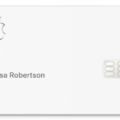
Are you an Apple Card holder? Have you been wondering what the minimum payment is for your card? Well, you’re in the right place! In this blog post, we’ll explain exactly what the minimum payment is and how it works.
The Apple Card minimum payment is the amount that must be paid each month to keep your account current. The minimum payment calculation is determined by your account balance, interest rate, and other factors. Generally, the higher your balance and interest rate are, the higher your minimum payment will be.
You can find out what your minimum payment due is by opening the Apple Wallet app on your iPhone and tapping your Apple Card. Then, tap Pay and press and slide counterclockwise until the wheel turns red and stops. You’ll see the minimum payment due listed there.
Paying more than the minimum amount due each month can help reduce the number of payments you have to make as well as lower interest charges on future purchases. However, the main requirement is that you pay at least the minimum payment due. That will help you avoid late payment fees.
Understanding Apple Card Payment Terms
If you want to avoid interest charges, you should pay your statement balance in full every month. The full balance payment is automatically selected when you select Pay in Apple Wallet. You can switch it to the minimum payment due, but that means that interest will start being charged for the amount you are not paying.
Like other cards, there is an Apple Card grace period in which late payments will not be reported as late to the credit bureaus until 30 days have passed since the billing cycle for which the payment was due. However, it’s a good idea to keep your payments current to avoid late payments altogether.
To do that, you can set up scheduled payments so that payments are made automatically from a valid funding source.
How to Find Your Minimum Payment Due
The minimum due on your Apple Card can be found in the Wallet app on your iPhone. To access it, open the Wallet app, then tap Apple Card. Next, tap Pay and press and slide counterclockwise until the wheel turns red and stops. This will display the minimum payment due for that month.
To pay it, follow the payment instructions on-screen.
Making Payments to Your Apple Card
Acceptable Apple Card payment methods include a bank transfer from a connected bank account and Apple Cash. Apple Cash is a kind of digital payment card that allows you to store, send, and receive money from your phone.
You can also pay with cashback that you earn from making payments with your Apple Card. More on that later.
There are no Apple Pay limits associated with these payment methods, but your balance in your bank account, Apple Cash, or cash back balance has to cover the payment amount (combined).
For example, if you are making a $100 payment with Apple Cash, and your Apple Cash balance is only $40, the remaining $60 will be drawn from your selected bank account.
Some things to note: If you set up scheduled payments, you can always make early payments as well manually, either from the same or a different payment method. Furthermore, the minimum payment will always include installment payments on Apple products that you bought on an installment plan with zero interest. More on installment plans later.

Apple Card Payment Due Dates
The Apple Card due date is typically the last day of the month. Your billing cycle ends on the last day of the month, and your due date for that billing cycle is the last day of the next month.
For example, for charges made in January, your billing cycle ends in January. Your minimum balance due and total statement balance will be calculated, and you then have up to the last day of February to pay it.
If you don’t make a minimum payment by then, you can be charged late payment fees. Interest accrual will also start being applied. Therefore, it’s important that you make your payments according to the defined payment schedule.

The Benefits of Paying More Than the Minimum
You might wonder if there’s any reason to pay more than the minimum payment due. Why can’t you just keep paying the minimum payment forever?
The answer is that early payoffs have many financial benefits, primarily interest savings. Interest will keep piling up if you only pay the minimum payment. That means that your total due will keep increasing due to interest, even if you stop making new purchases with your credit card. That also means that the minimum balance due will keep increasing as well, since the minimum balance depends on the total due.
As your total balance increases, your minimum payments will often only cover the total interest and a bit more. For example, you might owe $25 in interest alone, and if you are paying a $30 minimum payment, you are not doing much to decrease the total usage on your card. You can get caught up in an endless cycle of only paying off interest, which can have a credit score impact in the long run.
That’s because your credit score depends on several factors, one of them being your credit utilization, or how much of your total available credit you have used up. By reducing this amount, your credit score will go down. If you only make minimum payments, it won’t go down or will go down very slowly, depending on your interest rates.
Daily Cash and How It Impacts Payments
Daily Cash is a form of Apple rewards. You earn cashback rewards for purchases you make with your Apple Card on a daily basis. You can use the Daily Cash you earned for Apple purchases as a payment offset for your Apple Card payments. In other words, if you earned $5 in Daily Cash, and you need to make an Apple Card payment of $15, you can reduce your payment to $10 by applying your Daily Cash balance.
You can also simply send the Daily Cash to Apple Cash so you can use it as real money when paying with Apple Pay.
Apple Card Monthly Installments: A Deeper Look
Apple Card Monthly Installments allow you to pay over time with your Apple Card when purchasing Apple Products. For example, if you want to purchase an iPhone, you can split the cost of the iPhone into monthly installment payments so you don’t have to pay the entire price upfront.
The good part about Monthly Installments is that they offer interest-free financing. Unlike regular credit card purchases on your Apple Card, these eligible purchases qualify for no-interest payment plans.
You can have several installment plans at once for different products. However, the monthly installment amount will be added to your minimum balance due. For example, if your minimum balance due is $20 for your regular credit card purchases, but you started an installment plan in which you pay $40/month, your new minimum balance due will be $60.
Remember, not all purchases qualify for monthly installments. It’s reserved for select Apple products. If you use your Apple Card to purchase regular stuff, these purchases will incur interest and will not qualify for a fixed monthly installment plan.
Troubleshooting Apple Card Payment Issues
Let’s go over some troubleshooting tips to help with Apple Card issues.
- Declined payment: If a payment is declined, there probably isn’t enough cash in the funding source. Make sure to deposit money into the funding source or choose a different one.
- Payment error: A payment error can occur due to a glitch or incorrect payment source details. Make sure your bank details are correct.
- Other payment issues: For other payment issues, contact Apple Card support.
Conclusion
In this article, we’ve touched upon various topics related to the Apple Card, as well as several Apple Card benefits and drawbacks. It’s important to follow credit card best practices, like always paying off your balance in full every month, and ensure responsible credit card use, such as avoiding overspending, for your financial well-being. With broad Apple ecosystem integration, you can easily manage your payments, earn cash back, and make monthly payments from your bank accounts.








